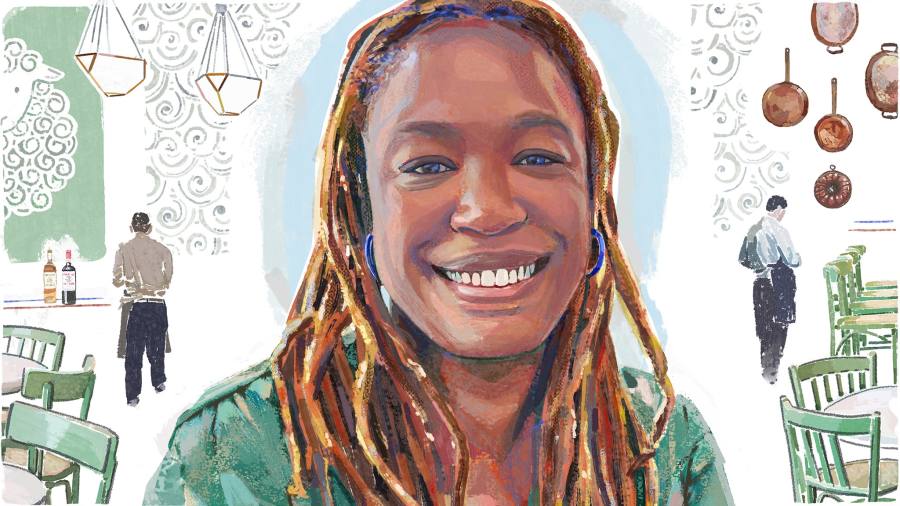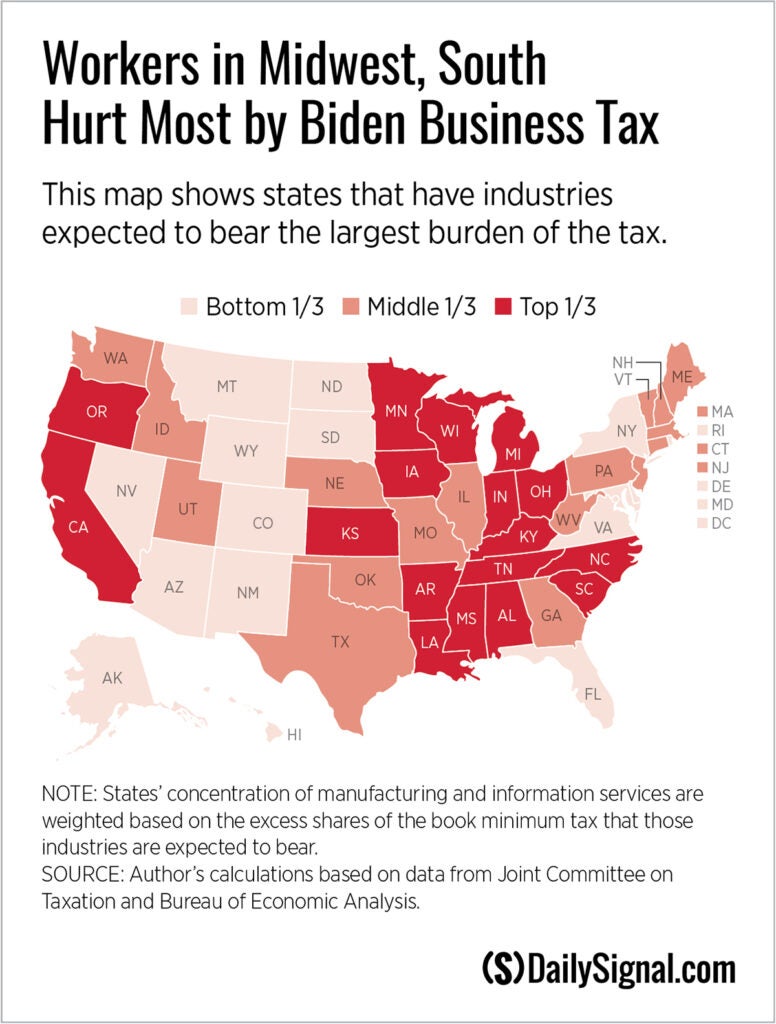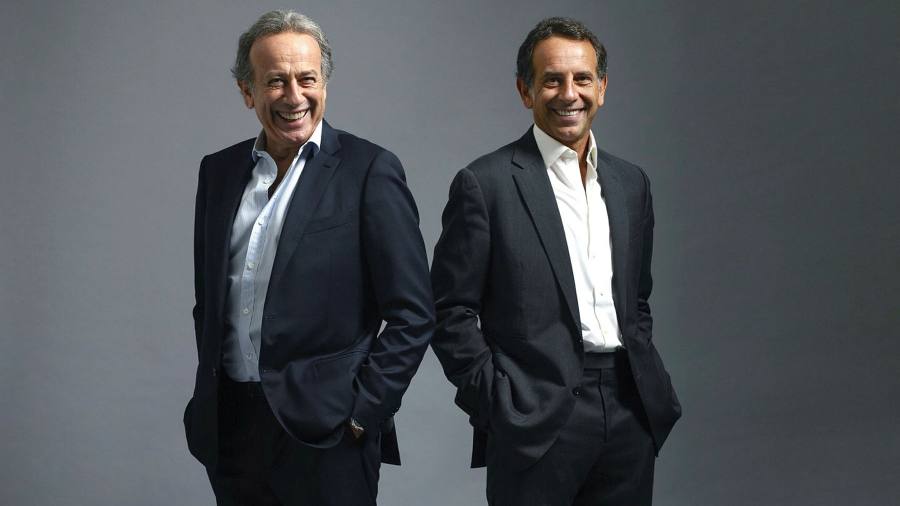[ad_1]
It takes precisely 56 minutes of lunch chatter — and two large glasses of rosé — before I utter the word that has divided opinion across Britain and beyond: Meghan.
“What do you think about her?” I ask my companion across the table: Heather McGhee, a 41-year-old American economist, activist and author of a new book on racism.
“Meghan? Whoaah!” says McGhee, dragging out the syllable with a long, throaty chuckle, as she ponders the actress and wife of Prince Harry, who sparked a storm in March when she told Oprah Winfrey she had been the victim of racism in the royal family.
McGhee stabs her fork into a kale salad that is the same hue as her top. The vibrant tone livens up the bland decor of La Pecora Bianca, a modest Italian eatery in midtown Manhattan.
“[Meghan] shows the cost of racism to Britain — and generally,” she continues. “Like many black women in the United States, I watched Meghan’s interview with Oprah hanging on every word, feeling quite a sense of solidarity with her, [over] black women in the workplace issues.”
I point out that some viewers had a completely different reaction, and felt that Markle was being unfair to the Windsors, having failed to fully appreciate the duties and constraints of life as a royal. McGhee is indignant: “Look at how the British press went after her — she felt exposed.”
But McGhee is less interested in laying blame than in stressing something else: this is a tale of missed opportunities. “The royal family should have protected her — they had an incredible asset, a chance to reinvigorate the monarchy in a low-cost way for the global majority who are people of colour, and for their Commonwealth. They should have tried to make it work. Imagine how different it could all have been.”
It is a point that extends well beyond the House of Windsor. As Joe Biden’s administration crafts policies that aim to help the US recover from the Covid-19 pandemic — and the country’s bitter racist legacy — McGhee is on a more ambitious mission of imagination: she believes we all need to rethink our attitude to race to search for opportunity.
The manifesto is laid out in her book, The Sum of Us. Born and raised in the South Side of Chicago — where Michelle Obama was raised — as a child McGhee grabbed every educational opportunity she could find, ending up at Yale and Berkeley School of Law. From there she went to Demos, the policy think-tank, rising to become its president, grappling with macroeconomic issues that had nothing to do with race — let alone royals.
But after 15 years, she became disillusioned, convinced that economists were missing half the story; culture mattered too. Her hard-working, aspirational black parents had scrambled to lift their children into the middle class when segregation had (supposedly) long been dismantled; but when McGhee looked at data on the economy she could see that this elevation was occurring just as the middle class was being smashed apart. She wanted to understand why.
So in 2017, after Donald Trump became president, she made the decision to quit her job and travel America looking to uncover the root causes of racial inequality, as well as possible solutions. Many of the details she uncovered for her book are shocking. “Did you know that black single women in their thirties and forties were found to have a median net worth of $5 in a study a few years ago?” she asks. (I did not, to my shame.)
Yet McGhee’s research also inspires hope, too; or, more accurately, it is a call to arms. As well as decrying the damage racism does to black people, she also highlights the cost to whites, arguing that when white majorities fight to protect their privilege, they often sabotage their own interests.
To explain this, she cites an eye-catching true story: the paradox of “draining the pool”. Until the mid-20th century, America had numerous public pools. But during desegregation, white communities were so determined to exclude black swimmers from these pools that many shut down these recreational assets instead of sharing them. The result? Everybody lost.
McGhee thinks, however, that if white people understood this self-sabotage, they would have “skin in the game” to fight against racism too. So she wants to explain that by collaborating we can all “refill the pool . . . and get nice things” — be that cheap swimming, better housing, healthcare, jobs and a cleaner environment.
From a dispassionate perspective, it is hard to argue with the logic in the book. I love the battle against “zero sum” thinking and McGhee’s insistence that diverse thinking builds more innovation. But I also know that cool-headed rationality is not the dominant impulse in any debate about racism today. The murder of George Floyd a year ago next week and the reinvigoration of the Black Lives Matter movement has brought a new intensity to conversations over race and injustice.
“An estimated 15-20m white people demonstrated to protest police brutality in the summer of 2020,” she writes in her book, noting that “95 per cent of the countries where BLM protests were held were majority white”. But then rightwing voices depicted BLM activists as violent thugs, and focused on unrest around the protests. As a result “the share of white Americans who said that racism was a big problem fell from 45 per cent in June after George Floyd’s death to just 33 per cent in August.”
“So how have people reacted to the book?” I ask, as we sit down to lunch. McGhee’s answer is interrupted by the waiter. She chose La Pecora Blanca because it is close to her next appointment, and it feels strictly functional: a simple menu and unprepossessing location, tucked between noisy construction sites on Manhattan’s Second Avenue. We can hear traffic thunder. Once, I might have been irritated. Now it is oddly cheering. A year ago, Manhattan was a ghost town, where the main sounds were birdsong — and ambulance sirens. Now it is opening up.
“We should have a drink to celebrate [reopening]!” I suggest.
“Yes! A lavender spritz! No — rosé!” I follow suit, reasoning that it is almost summer. Our glasses clink. “To summer! To renaissance! To business lunches!”
The starters arrive: beet salad for me, and Toscana kale salad for her without breadcrumbs (“I can’t eat those, they make me fat,” she says). We discuss the perils of carbs as I nibble the beets and return to the theme: the reaction to her message?
Menu
La Pecora Bianca
950 2nd Avenue, New York, 10022
Roasted beets $15
Toscano salad $16
Scallops x2 $58
Rosé x2 $28
Pellegrino (large) $8
Double espresso $6
Espresso $4.50
Total (inc tax) $147.53
“I have been quite surprised by how encouraging and positive the reception has been,” she replies. “I was expecting pushback from black people asking ‘why are you talking about whiteness?’ and from my economist friends saying ‘why are you talking about race when you should be talking about class?’ But the coronavirus pandemic primed people for the book because it exposed so many inequalities. Then there were the events of January 6.”
These events were the attack on Congress by Trump supporters convinced the election had been “stolen” by illegal voting. Emotions still run high. This is partly because of the abject failure of the security forces to protect the Capitol against a rightwing mob — at a time when police killings of black Americans have continued. It is also because Republican legislators are changing the voting rules in states such as Georgia to make it more onerous to vote — a move Democrats see as designed to deter some black citizens.
Many progressives, among them President Biden, decry this as a throwback to the “Jim Crow” era. However, McGhee demurs and suggests that is half wrong: the changes also hurt white voters, who can also be knocked off the register (her book narrates how white women can disappear from registers if they change their name). As with the swimming pools, she argues, everyone loses out.
But do white people understand this self-sabotage? I ask, as our main course arrives: we both have scallops, which are nestling on white sauce, sprouts and cranberries. The sauce is bland but the shellfish is very tasty.
“Because I released this book in a pandemic you get feedback in a different way,” she says. “You can’t go to bookstores and have people lining up to tell me their stories. But with social media there is this weird intimacy — people DM me every time they finish a chapter! Most white people who read it say the book is ultimately hopeful but causes some level of emotional distress. People of colour already know racism causes white people to do crazy stuff. But white people don’t realise how it has been hurting us all.”
She blames this on the fact that we have inherited a zero-sum mentality from history: white people fear that helping black people will create a loss for them, because they also assume that prior racism has created a sense of advantage. “When progressives only talk about the costs of racism [to black people] we are often doing the marketing for it — for the rightwing,” she says. “We need to tell white people that we are not looking for a place where you are suffering like black people are suffering, but where nobody is suffering.”
This point goes beyond just the white-black dynamic, she adds. Sexism exists in the black community because black men think that reducing the power of women will elevate their own status. “Trump targeted black and brown men with the message that the end of the patriarchal order is a threat to you,” she says, noting that it “sometimes worked.” Similarly, Latinos often try to distance themselves from the black community, or denigrate black people, because they want to boost their own status by allying with the white community — much as the Irish did a century ago. That means the definition of what is “white” has shifted over time, sparking subtle but vicious fights, as another writer, Isabel Wilkerson, has pointed out in her own recent book, Caste.
So doesn’t that make racial labels nonsensical? Why even talk about “black” and “white”?
My question is partly sparked by intellectual curiosity, since my next book explores (among other things) how malleable and contradictory our ethnic and cultural symbols are. But I have personal reasons to ask this, too: my daughters have white British and Nigerian heritage.
When they were young, they went to a school in cosmopolitan London that had so many ethnically mixed families that “race” was a blur, not box.
But when we moved to New York, the children were constantly asked, directly and in bureaucratic forms, if they were “black” or “white”. Sometimes the label “mixed race” is offered too, but not always. It infuriated us, since the boxes seemed so artificial. Maybe that was because of our relative economic advantages, or different transatlantic sensibilities. Either way, it is a problem McGhee has to grapple with herself: her husband is part Pakistani and part white. “We tell [our son] that he is Blackistani,” she laughs. “But part of me wants him to identify as black, and I want to equip him for that in case that is how the world identifies him.”
But why make boxes at all? “The reason we have a box is that our country had a one-drop rule — it was very important to know whether you were black or white because there were material and political consequences of that box,” McGhee says. “When our society becomes less hierarchical . . . when the life experience converges hopefully to a higher plane it will matter less. I want a place where we have a shared identity.”
Could Biden and Harris — herself of mixed Indian and Jamaican heritage — deliver this nirvana?
“I am so encouraged [by Biden],” enthuses McGhee. Even though she backed Elizabeth Warren in the Democratic primary races, “I love the way [Biden] has centred racial equity in policies. I can talk about the American jobs plan and rescue plan and family plan in terms of refilling the public pool of goods.”
Do you want more? One idea floated by the BLM movement is that the government or big companies should pay reparations to black people for the abuse inflicted on their ancestors, via the slave trade and other forms of structural racism. Does she support that? She knows that this is controversial. “Yes — I do think that there is a case for reparations economically and morally, but it’s politically difficult,” she says. However, she suggests that Biden should embrace a proposal advanced by the New Jersey senator Cory Booker to offer “baby bonds” to the poorest families in America, who tend to be overwhelmingly black. This is akin to reparations for the black community — albeit under another name.
But she also insists that reparations — like so many other anti-racist policies — need to be rebranded as a case of “refilling the pool”, benefiting everyone: if black communities became wealthier, there would be more economic growth for all.
I find it hard to believe that the American right would ever accept reparations as anything other than “woke” sentiment turned extreme — or a direct attack on their own wealth. Even talking about it seems likely to spark a damaging backlash. Yet McGhee has such an optimistic demeanour that after listening for an hour, it is tantalisingly easy to embrace her vision. “It’s not just about America but everywhere else in the world,” she says. She cites Brexit as another example of people “draining the pool”: in her view the vote displayed a sense of nativism and prejudice that also caused people to inflict economic self-harm.
“In the future we will need a collaborative approach to tackle everything, starting with climate change.”
I nod, and pay the cheque. Glowing with rosé, and full of fresh hope for the New York summer, I want to feel optimistic. Yet strangely it is our conversation about Meghan Markle that stays on my mind. If nothing else, that shows how emotive these issues are.
“It doesn’t have to be like this!” McGhee insists. And with that, she heads out into the newly noisy streets of New York.
‘The Sum of Us: What Racism Costs Everyone and How We Can Prosper Together’ by Heather McGhee is out now
Gillian Tett is chair of the FT editorial board and editor-at-large, US
Follow @FTLifeArts on Twitter to find out about our latest stories first
[ad_2]
Source link


